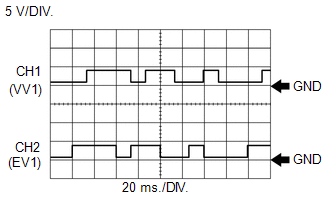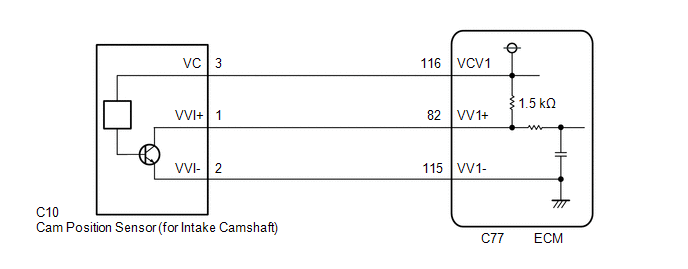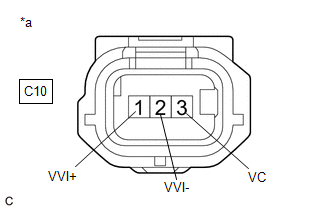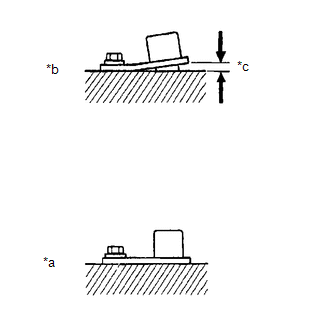- DTC judgment completed
- System normal
| Last Modified: 07-31-2024 | 6.11:8.1.0 | Doc ID: RM100000001GHA1 |
| Model Year Start: 2020 | Model: Corolla | Prod Date Range: [01/2019 - 03/2019] |
| Title: 2ZR-FAE (ENGINE CONTROL): SFI SYSTEM: P0340; Camshaft Position Sensor Circuit; 2020 MY Corolla [01/2019 - 03/2019] | ||
|
DTC |
P0340 |
Camshaft Position Sensor Circuit |
DESCRIPTION
The cam position sensor for the intake camshaft (VV1 signal) consists of a magnet and MRE (Magneto Resistive Element).
The intake camshaft has a timing rotor for the cam position sensor. When the intake camshaft rotates, changes occur in the air gaps between the timing rotor and MRE, which affects the magnetic field. As a result, the resistance of the MRE material fluctuates. The cam position sensor converts the camshaft rotation data to pulse signals, uses the pulse signals to determine the camshaft angle, and sends it to the ECM. Then the ECM uses this data to control fuel injection duration and fuel injection timing.
|
DTC No. |
Detection Item |
DTC Detection Condition |
Trouble Area |
MIL |
Memory |
|---|---|---|---|---|---|
|
P0340 |
Camshaft Position Sensor Circuit |
One of the following conditions is met:
|
|
Comes on |
DTC stored |

Reference: Inspection using an oscilloscope.
HINT:
- The correct waveform is as shown.
- VV1 stands for the cam position sensor (for intake camshaft) signal, and EV1 stands for the cam position sensor (for exhaust camshaft) signal.
|
ECM Terminal Name |
CH1: Between VV1+ and VV1- CH2: Between EV1+ and EV1- |
|
Tester Range |
5 V/DIV., 20 ms./DIV. |
|
Condition |
Idling with warm engine |
MONITOR DESCRIPTION
If no pulse signal is transmitted by the cam position sensor (for intake camshaft) despite the camshaft rotating, or the rotation of the camshaft and the crankshaft is not synchronized, the ECM interprets this as a malfunction of the sensor.
MONITOR STRATEGY
|
Related DTCs |
P0340: Cam position sensor verify pulse input |
|
Required Sensors/Components (Main) |
Cam position sensor (for intake camshaft) |
|
Required Sensors/Components (Related) |
Crank position sensor |
|
Frequency of Operation |
Continuous |
|
Duration |
4 seconds: Cam position sensor verify pulse input (case 2) 5 seconds: Cam position sensor verify pulse input (case 1) |
|
MIL Operation |
2 driving cycles: Cam position sensor verify pulse input (case 2) Immediate: Cam position sensor verify pulse input (case 1) |
|
Sequence of Operation |
None |
TYPICAL ENABLING CONDITIONS
Cam Position Sensor Verify Pulse Input (Case 1)
|
All of the following conditions are met |
- |
|
Engine speed |
600 rpm or higher |
|
Starter |
Off |
|
VVT system mis-alignment |
Not detected |
|
Cam position sensor range check fail (P0342, P0343) |
Not detected |
|
Cam position sensor voltage |
0.3 to 4.7 V |
Cam Position Sensor Verify Pulse Input (Case 2)
|
Monitor runs whenever the following DTCs are not stored |
None |
|
Both of the following conditions are met |
- |
|
Starter |
On |
|
Minimum battery voltage while starter on |
Less than 11 V |
TYPICAL MALFUNCTION THRESHOLDS
Cam Position Sensor Verify Pulse Input (Case 1)
|
Either of the following conditions is met |
1 or 2 |
|
1. Camshaft position and crankshaft position alignment |
Mis-alignment |
|
2. Cam position sensor signal |
No signal |
Cam Position Sensor Verify Pulse Input (Case 2)
|
Cam position sensor signal |
No signal |
COMPONENT OPERATING RANGE
|
All of the following conditions are met |
- |
|
Cam position sensor signal |
Signal input |
|
Camshaft position and crankshaft position alignment |
Aligned |
CONFIRMATION DRIVING PATTERN
- Connect the Techstream to the DLC3.
- Turn the ignition switch to ON.
- Turn the Techstream on.
- Clear the DTCs (even if no DTCs are stored, perform the clear DTC procedure).
- Turn the ignition switch off and wait for at least 30 seconds.
- Turn the ignition switch to ON.
- Turn the Techstream on.
- Start the engine.
- Idle the engine for 10 seconds or more.
- Enter the following menus: Powertrain / Engine and ECT / Trouble Codes.
-
Read the pending DTCs.
HINT:
- If a pending DTC is output, the system is malfunctioning.
- If a pending DTC is not output, perform the following procedure.
- Enter the following menus: Powertrain / Engine and ECT / Utility / All Readiness.
- Input the DTC: P0340.
-
Check the DTC judgment result.
Techstream Display
Description
NORMAL
ABNORMAL
- DTC judgment completed
- System abnormal
INCOMPLETE
- DTC judgment not completed
- Perform driving pattern after confirming DTC enabling conditions
N/A
- Unable to perform DTC judgment
- Number of DTCs which do not fulfill DTC preconditions has reached ECU memory limit
HINT:
- If the judgment result shows NORMAL, the system is normal.
- If the judgment result shows ABNORMAL, the system has a malfunction.
-
If the judgment result is INCOMPLETE or N/A and no pending DTC is output, perform a universal trip and check for permanent DTCs.
HINT:
- If a permanent DTC is output, the system is malfunctioning.
- If no permanent DTC is output, the system is normal.
WIRING DIAGRAM

CAUTION / NOTICE / HINT
HINT:
- If no problem is found through this diagnostic troubleshooting procedure, there may be a mechanical problem with the engine.
- Read Freeze Frame Data using the Techstream. The ECM records vehicle and driving condition information as Freeze Frame Data the moment a DTC is stored. When troubleshooting, Freeze Frame Data can help determine if the vehicle was moving or stationary, if the engine was warmed up or not, if the air fuel ratio was lean or rich, and other data from the time the malfunction occurred.
PROCEDURE
|
1. |
CHECK HARNESS AND CONNECTOR |

|
*a |
Front view of wire harness connector (to Cam Position Sensor (for Intake Camshaft)) |
HINT:
Make sure that the connector is properly connected. If it is not, securely connect it and check for DTCs again.
(a) Disconnect the cam position sensor (for intake camshaft) connector.
(b) Turn the ignition switch to ON.
(c) Measure the voltage according to the value(s) in the table below.
Standard Voltage:
|
Tester Connection |
Condition |
Specified Condition |
|---|---|---|
|
C10-3 (VC) - Body ground |
Ignition switch ON |
4.5 to 5.5 V |
|
C10-1 (VVI+) - Body ground |
Ignition switch ON |
3.0 to 5.0 V |
(d) Turn the ignition switch off and wait for at least 30 seconds.
(e) Measure the resistance according to the value(s) in the table below.
Standard Resistance:
|
Tester Connection |
Condition |
Specified Condition |
|---|---|---|
|
C10-3 (VC) - C10-1 (VVI+) |
Ignition switch off |
1.425 to 1.575 kΩ |
|
C10-2 (VVI-) - Body ground |
Always |
Below 1 Ω |
| NG |

|
|
|
2. |
CHECK SENSOR INSTALLATION AND CONDUCT VISUAL INSPECTION (CAM POSITION SENSOR (FOR INTAKE CAMSHAFT)) |

|
*a |
OK |
|
*b |
NG |
|
*c |
Clearance |
(a) Visually check the cam position sensor (for intake camshaft) for damage.
(b) Check the cam position sensor (for intake camshaft) installation.
OK:
The cam position sensor (for intake camshaft) does not have any damage and is installed properly.
| NG |

|
SECURELY REINSTALL CAM POSITION SENSOR (FOR INTAKE CAMSHAFT) |
|
|
3. |
INSPECT CAMSHAFT HOUSING SUB-ASSEMBLY (INTAKE CAMSHAFT) |
(a) Inspect the timing rotor of the intake camshaft.
OK:
Camshaft timing rotor does not have any cracks or deformation.
HINT:
Perform "Inspection After Repair" after replacing the camshaft housing sub-assembly.
| OK |

|
| NG |

|
|
4. |
CHECK HARNESS AND CONNECTOR (CAM POSITION SENSOR (FOR INTAKE CAMSHAFT) - ECM) |
(a) Disconnect the cam position sensor (for intake camshaft) connector.
(b) Disconnect the ECM connector.
(c) Measure the resistance according to the value(s) in the table below.
Standard Resistance:
|
Tester Connection |
Condition |
Specified Condition |
|---|---|---|
|
C10-1 (VVI+) - C77-82 (VV1+) |
Always |
Below 1 Ω |
|
C10-2 (VVI-) - C77-115 (VV1-) |
Always |
Below 1 Ω |
|
C10-3 (VC) - C77-116 (VCV1) |
Always |
Below 1 Ω |
|
C10-1 (VVI+) or C77-82 (VV1+) - Body ground and other terminals |
Always |
10 kΩ or higher |
|
C10-2 (VVI-) or C77-115 (VV1-) - Body ground and other terminals |
Always |
10 kΩ or higher |
|
C10-3 (VC) or C77-116 (VCV1) - Body ground and other terminals |
Always |
10 kΩ or higher |
| OK |

|
| NG |

|
REPAIR OR REPLACE HARNESS OR CONNECTOR |
|
|
|
![2020 MY Corolla [01/2019 - 03/2019]; 2ZR-FAE (ENGINE CONTROL): SFI SYSTEM: DTC CHECK / CLEAR](/t3Portal/stylegraphics/info.gif)
